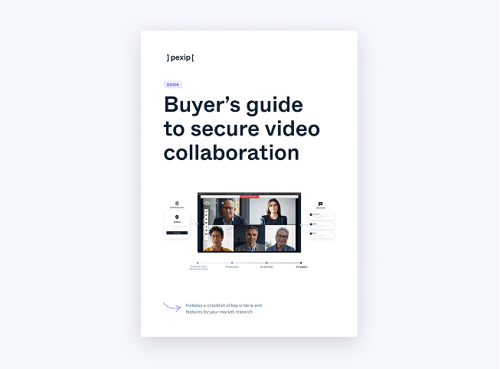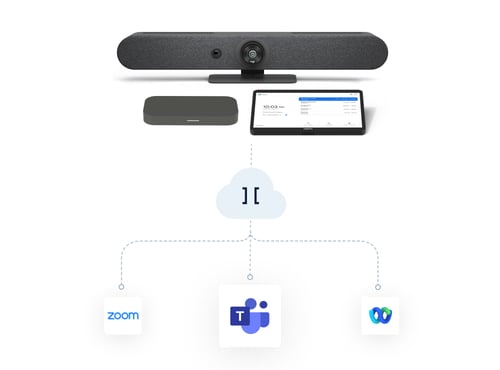Many organizations have already taken precautions to better secure their video meetings, such as implementing zero trust architectures, employing comprehensive access controls, and adopting strict meeting data control.
But, in a world in which AI is amplifying everything, including video meetings, we suddenly have a lot more data to worry about. What happens when every meeting results in an AI-generated document?
AI has and continues to change video communication as we know it, powering possibilities like transcription, translation, sentiment analysis, and meeting summaries. But, with these productivity enhancements comes even more data that, simply put, must be protected – especially if you are in a highly regulated or critical societal organization.
The reality is that the data processed by AI is often just as sensitive as the meeting itself, and failing to protect it can lead to serious repercussions. Imagine an executive’s meeting transcript getting into the wrong hands, or private customer health information leaking, or extremely confidential merger agreements made public. For industries like defense, healthcare, finance, and legal services, where confidentiality is paramount, a private, self-hosted AI solution for video meetings is no longer just an option. It’s a necessity.
Step 1: Find out what’s happening to your AI data
The first question organizations should ask themselves is: where is all our AI data going? If you're using a cloud-based video meeting platform with AI features, its likely that your data is outside of your control, and is potentially being stored or analyzed in ways you can’t monitor.
The same reasons that drive organizations to prioritize secure meetings—control, confidentiality, and compliance—should also apply to AI data. Whether it’s the transcript of a sensitive board meeting, the AI-generated live captions in your client meeting, or patient data discussed during a telehealth session, that information deserves the same level of protection as the meeting itself.
Step 2: Understand if you need to take control of your AI data
Self-hosted, private AI solutions—where the AI infrastructure is deployed and managed within your own environment—offer a robust alternative to cloud-based AI systems. These solutions are particularly valuable to organizations that face one or several of the following scenarios:
- Regulatory requirements demand sovereignty or non-public cloud solutions: Industries bound by regulations like GDPR, HIPAA, or specific national laws often need to ensure data sovereignty. This means their data cannot leave certain geographical boundaries or must remain within private infrastructure.
- Sensitive personal data is involved: Healthcare providers, law firms, and financial institutions routinely handle data that, if compromised, could have devastating consequences for individuals and organizations alike.
- Your organization prioritizes security and control: For companies with a strict internal policy on data governance, keeping data in-house ensures that no external party has access to it.
- You want to eliminate third-party risks: By managing AI data internally, you avoid exposing it to third-party vendors who may have less stringent security practices or conflicting data usage policies.
Step 3: Discover the benefits of a private, self-hosted AI solution
A private AI solution that is self-hosted by your own organization provides several critical benefits that align with the need for secure and private video conferencing.
- Your data remains under your control. Self-hosted AI gives you control over how data is processed, stored, and accessed. This eliminates the uncertainties that come with third-party AI providers.
- No risk of data misuse by third parties. Many cloud-based AI solutions rely on aggregating user data to train their algorithms. Self-hosting ensures your data is used solely for your purposes and never shared or repurposed.
- Customizable security architecture. Self-hosting allows you to implement security measures tailored to your organization’s unique needs. Whether it’s access control or zero-trust architecture, you have the flexibility to set your own rules.
- Regulatory compliance is easier to achieve. Compliance standards become more straightforward to meet when your data stays within a controlled environment. You can audit processes and ensure adherence to local and industry-specific regulations without relying on external vendors.
Step 4: Get in touch with a Secure Meetings and Private AI provider like Pexip
As AI becomes a key part of video meetings, security-conscious organizations need to think beyond the immediate benefits of these technologies and take control of how their data is handled.
A self-hosted, private AI solution provides the security, control, and compliance demanded by modern organizations with strict compliance requirements. By keeping your AI data as secure as your video meetings, you can better protect your organization’s most valuable asset: its information.
Whether you're navigating complex regulatory landscapes or simply ensuring your internal policies are upheld, reach out to Pexip to learn more about how Pexip Private AI can enhance your Pexip Secure Meetings solution.





